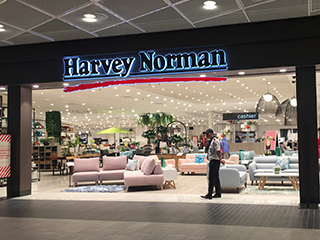
Despite a continuing fall in total network sales, Australian homewares, furniture and electronics retailer Harvey Norman has secured a $222.77m half-yearly profit after tax, up $15.08m on the same period last year.
The majority of the 7.3 per cent total network profit growth was tied up in offshore company-operated retail sales revenue, which saw a rise of 25.4 per cent for the period, to $77.53m up from $61.82m.
Gerry Harvey, Harvey Norman chairman said a number of international initiatives had been implemented over the period, leading to an increase in global brand recognition.
“The last six months have seen outstanding results from our stores in Singapore and Malaysia, building on the growth we’d already experienced in the region and really delivering in an impressive manner,” Harvey said.
“We’ve found this region to be a very fertile testing-ground for taking new ideas to market, both in retail presentation and proof-of-concept. Quality performance like this further enhances our brand in the region, and provides a solid foundation for further development in the near future.”
While the results confirm Harvey Norman’s decision to invest heavily in overseas flagship stores has paid off on an international level, it may have come at a cost.
The massive Australian retailer reported a fall of 1.7 per cent in total sales for its domestic Harvey Norman, Domayne and Joyce Mayne franchised stores, sliding to $2.95bn for the period.
Compounding this, a $7.18m decrease in franchise fees received led to a 5.2 per cent fall in profit from Australian franchisees, which the company earns through fees, rental payments and outgoings, down to $158m.
Harvey Norman chalked the results up to changing economic conditions in the franchise sector, suggesting that a rise in operating expenses of the franchisor to monitor and evaluate compliance with franchise agreements was a catalyst for the fall.
The company also went on to outline higher rents and outgoings received from franchisees for externally-leased retail sites and higher interest to implement and administer the financial accommodation facilities as further challenges to the profitability of its Australian franchised stores.
The decision to reduce fees and increase financial accommodation came after news reports revealed that Harvey Norman shareholders had dished out $7.8m in “tactical support” for a struggling franchisee back in October.
In its latest results presentation, Harvey Norman confirmed that tactical support payments aimed at protecting, enhancing and promoting the Harvey Norman, Domayne and Joyce Mayne brands were an expense of the franchisor.
Despite the Australian franchisee results, Harvey Norman remained positive, suggesting a growing net asset value, anchored by the company’s robust property portfolio placed the retailer in an advantageous position moving into the second half.
“Our property portfolio continues to be a major point of difference for us, and is a real competitive advantage against emerging or restructured competitors – both big or small, online or physical,” Harvey said.
“It keeps us a step-ahead and provides the flexible, large footprint needed to showcase the best on offer.”

